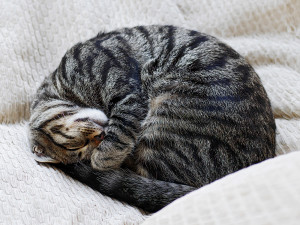Why Does Your Cat Wake You Up at Night?
You want to sleep, your cat wants to party. Here’s how to deal.
Picture it: The cat was energetically licking my eyelashes in an attempt to get my attention. I was keeping my eyes tightly closed in an attempt to continue to sleep — at least until sunrise. Sigh.
As wonderful as it is to share a home with a cat, if your cat keeps acting like an alarm clock at 3 a.m. you may not be in the mood to recommend a cat to other people. You may be too tired or too annoyed, but either way, you’re in no shape for proper feline PR work. Understanding why your cat is seeking your attention at night and knowing what to do about it can be life-changing, and only then you can get back to raving about the wonders of having a cat.
Save on the litter with color-changing tech that helps you better care for your cat.
Why does my cat wake me up at night?
Although it’s commonly said that cats are nocturnal, the reason for why they’re bothering you at night is not that simple. The issue with cats desperately seeking our attention when we are desperately trying to sleep is more complex than cats being on a schedule that doesn’t naturally match ours. Chances are, if your cat is waking you up at night, it’s because they want something from you — possibly something they didn’t get (or wanted more of) when you were awake.
They may seek your attention because they haven’t gotten enough of it during the day. It’s natural for your cat to miss you while you are away all day if work or other obligations mean you are gone a lot. It’s not unusual for cats who need more exercise, more stimulation, and more attention to try to get it by waking up the people who can offer them those things. Many cats are a little lonely, feeling bored, and looking to play, so when they see a person who doesn’t seem too distracted by some other activity (tragically, our sleep may not count as an activity to them!), they seek attention from that person. Sometimes cats wake people up at night because they want to eat — often because they are hungry, but at other times they may simply want a snack. (Who doesn’t occasionally want a midnight meal?)
How much do you spend on your pet per year?
Sometimes cats inadvertently wake us up as they seek a cozy spot to rest rather than to get our attention. (Is there any cozier spot than between our shoulder and our face? It often appears not.) They may want to be on top of us, next to us, near us, on our pillow, under our covers, or some other spot that involves waking us up to settle in just right. If your cat is waking you up stomping across the bed looking for the best spot, consider offering them a warm place all their own with a self-warming or heated cat bed.
What should I do about my cat waking me up at night?
Changing the behavior of a cat who wants your attention at night is best accomplished during the day rather than when the behavior is actually happening. That’s because preventing the attention-seeking behavior is the most effective way to stop it, and it will be more successful than reacting to it in the moment. The best way to keep your cat from waking you up at night is to tire your cat out during the day.
Getting your cat’s energy out goes way beyond exercise and involves giving your cat plenty of fun things to do and lots of ways to be active. Keep your cat’s body busy, and find ways to occupy their mind, too. One of the best ways to help a cat be ready to relax and sleep at night is to play with your cat more when you are awake. Use toys to get your cat running, jumping, chasing, boxing, and batting. Playing together is often especially fun for cats, but toys they can use to amuse themselves are also great.
Training your cat is a fantastic way to tire them out, and you reap the bonus benefit of a well-trained cat. You can teach your cat all kinds of things, such as to fetch, to sit, to go to their “place” (such as their bed or cat tree), to leap over objects or through hoops, to come when called, or to high-five.
Getting another cat may provide both cats with fun things to do. Not every cat will enjoy having a play buddy, and some may deeply dislike losing their “only cat” status. However, many cats love to have feline company, and this is especially true of kittens. In fact, experts generally recommend adopting more than one kitten at a time.
Some cats seek your attention at night because they want it to be morning so breakfast will be served. It’s common for cats to desire earlier and earlier feedings, resulting in cats who wake their parents up to be fed. To avoid this problem, change your routine so you don’t feed your cat immediately upon getting up. Take away their belief that they will be fed if they could just get you out of bed, so the sooner the better from their perspective. If you can free-feed your cat without them overdoing it, that may help (but definitely talk to your vet before you do so). Or feeding them a snack closer to bedtime may also stop the breakfast-alarm clock situation. A training session with generous treats before bed is one way to offer snacks to your cat and give them plenty of attention at the same time.
If your cat is trying to hang out with you at all hours of the night, consider yourself lucky they think so highly of you, but definitely take steps to reclaim your (precious sleeping) time.













